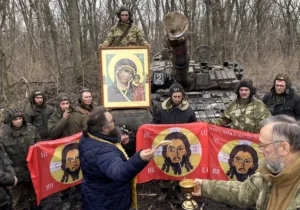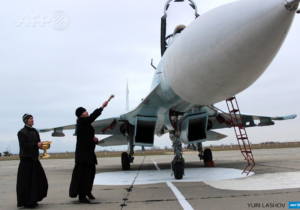In the West, the church has often defined itself by defying the state. In the East, particularly Russia, the church traditionally understands itself as more submissive consort to the regime. These conflicting civilizations partly explain why America and Russia cannot politically align.
Loyala University’s Michael Khodarkovsky last week in The New York Times detailed how Putin is the latest Russian despot to exploit the church’s historic political submission:
The Kremlin has relied on the Orthodox Church as the main unifying force in the country and provides it with generous financial support. In return, the church has been the key promoter of a “Russian world” concept that casts the Kremlin as a defender of Russians outside Russia. Patriarch Kirill, the head of the Russian Orthodox Church, has gone so far as to call the Putin era “a miracle of God.”
In the sixteenth century the Russian church developed the mythology of Moscow as the New Jerusalem and Third Rome, Khodarkovsky recalled, distinguishing from and elevating Russia above Western Christendom, which became the chronic adversary. This claim to spiritual superiority resting on perpetual suspicion has been constant across regimes, especially the Soviet atheist version, when the church was most egregiously subverted as state agent.
Khodarkovsky cites as the latest church collaboration with Kremlin a nationwide nationalist exhibition called “Russia — My History,” which glorifies murderous tyrants like Ivan the Terrible and Stalin while deriding liberal political reformers as Western agents. Its message: “Russia is a unique and separate Christian civilization whose responsibilities are only to God.” The exhibition was crafted by Bishop Tikhon Shevkunov, Putin’s reputed confessor, who must receive an earful indeed, needing fathomless absolution.
Russia’s Defense Ministry is building its own new cathedral, to be the nation’s third largest, with steps crafted from captured German WWII armor, Khodarkovsky notes. And apocalyptic rhetoric infuses Putin’s own pronouncements, which included an October warning that were the West to attack Russia, “we will respond, and we will end up in paradise as martyrs, while they will simply croak because they will have no time to repent.”
Arguably the Russian church’s submissive stance towards rulers dates to the very beginning. Russia’s earliest saints are the eleventh century Princes Boris and Gleb, sons of Prince Vladimir of Kiev, considered the baptizer of Russia and a rough equivalent of Constantine. An older son gained the throne and dispatched assassins to kill his potential brotherly rivals. Rather than fleeing or resisting, Boris awaited his execution by singing psalms and praying for his murderous older brother who was now his ruler. Gleb likewise awaited his own murder with prayerful resignation. The slain brothers were canonized as “passion-bearers” who submitted to authority rather than resist with violence.
Submission to authority as spiritually exemplary has been a constant theme in Russian history thanks partly to this venerated example. Stephen Kotkin’s recent second volume of his Stalin biography recounts how Russia’s most notorious despot fabricated endless plots against himself to justify his murderous purges. But the irony seems to have been that even as he killed and tormented millions, turning his nation into a slave camp, there were no known plots against him. When Stalin’s leading victims were executed, they died professing fidelity to him, seemingly sincerely.
In contrast, there was virtually no day during Hitler’s reign, at least until the failed July 20, 1944 coup, when there were not robust conspiracies against him. And when conspirators were executed, they breathed defiance. Neither Stauffenberg nor Bonhoeffer died submissively like Boris and Gleb, both basing their resistance on Christian faith.
Oddly, in a 2009 encounter, Putin seemed not to appreciate how the submissive nonresistance of Russia’s first saints facilitated his own rule. “But Boris and Gleb, although being saints, had given the country away without a fight,” he complained when looking at their portrayal in the religio-nationalist canvas Eternal Russia. “They just lay down and waited to be killed. This cannot be a good example for us…” The artist himself while escorting Putin compliantly agreed, replicating the saints’ unquestioned submission to authority.
One Russian writer rued that Putin’s comments were “the vestiges of the Bolshevik or even Chekist thinking that call us to fight to the last breath” and hoped “that all of us will live long enough to witness when our authorities will finally understand that the country entrusted to them is not just a state, but Holy Rus…” The same writer noted Saints Boris and Gleb had appeared in mystical visions on battlefields to great Russian warriors like Alexander Nevsky and Dimitry Donskoy to inspire martial defense of Russia. What the writer seemed not to admit was that the saintly tradition was not pacifist or peaceful, imploring destruction of Russia’s enemies and serene nonresistance only towards Russian rulers, no matter how tyrannical.
The Western Christian political tradition is less submissive, perhaps dating to when Bishop Ambrose of Milan compelled Emperor Theodosius publicly to repent of his punitive slaughter of a coliseum audience in Thessalonica. Western saints like Thomas Becket and Thomas More defied their monarchs in fidelity to the church. Protestants like John Knox confronting Mary Queen of Scots and Oliver Cromwell against Charles I raised Christian resistance of unjust earthly authority to a new level.
Several years ago I winced with American Protestant defiance when a senior American prelate in the Russian church visiting my office approvingly recalled that Russian peasants had left politics to the czar, contenting themselves with church, family and labor. Such deference to state authority is intrinsically at odds with the American project.
Putin style Russian despots dismiss resistance to their tyranny as agents of the West, especially America, with its spiritual limits on state authority, rooted in a very different Christian tradition. Some Western Christians are tempted to over celebrate the rebirth of Russian Orthodoxy after the Soviet nightmare. Orthodox Russia is better than Bolshevik Russia.
But in their deference to despotism and intrinsic hostility to Western freedoms there is a historical continuity across Russian regimes that must not be minimized. Russia’s spiritual destiny maybe as an ongoing geopolitical adversary for America.






